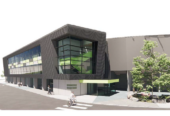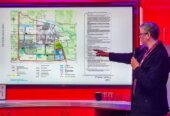A novel plan to make Cambridge road safer has arrived with fluorescent hit sticks and polka dots. The response in the News to date has been less than positive. Below, we hear from a Cambridge writer who offers a different perspective.
By Elizabeth Kirby-McLeod

When taking my children to school one day, shortly before the new Streets for People safety trial began, we came across a child’s body on the road. Two police cars were parked attempting to shelter the child while they waited for an ambulance, but we could still see the person sprawled there, facedown on the road, the bike cast away where it had landed. My heart pushed back into my spine to see it. A balloon inflated in my throat. Imagine being the parent receiving that call.
For this reason I can’t understand the self-righteous distain the trial is receiving from many in the community, in online groups and in the pages of the Cambridge News. Surely, making our streets safer for all road users is worth the change? But then I remember what I tell my children when they bike or walk alone – “You must look for the cars, you have to. It isn’t fair, it isn’t right, but they won’t look for you”.
I have experienced this myself. I love riding my bike in Cambridge however I have had times where I’m going through a roundabout – clearly with the right of way – and seen a car approaching at speed. It is clear that they believed the roads were empty and it wasn’t until I stopped and they flew past my front wheel that the look of horror crossed their face: what would have happened if I hadn’t looked for them?
They certainly weren’t looking for me.
Recent letter writers have said that the safety improvements being trialled create distraction. That seems to be rather their point. They force people to look anew at the road in front of them and by extension the other road users. When doing a Defensive Driving course many years ago I remember that being the number one safety takeaway – look for hazards, notice things, and respond to them. You and your car are not the only thing on or near the road.
Waipa District Council service delivery group manager Dawn Inglis has been very clear that if the changes do not lead to safety improvements they will not stay. But if they prove, as they have in other regions, to create safety gains for all road users, then opponents need to be prepared to accept them.
I was at a local event recently and heard Tracey Olivier say that change is easy, transformation is hard. We can change the roadscape but I doubt if real road safety for all can come until we transform our approach to how we drive on our roads. For too many, once they are in their car the black road ahead is theirs to be colonised, a landscape that appears to them somehow unpeopled. If nothing else the Streets for People trial is shaking this view: perhaps that is the real reason some are so opposed.
Elizabeth Kirby-McLeod is a Cambridge writer.









